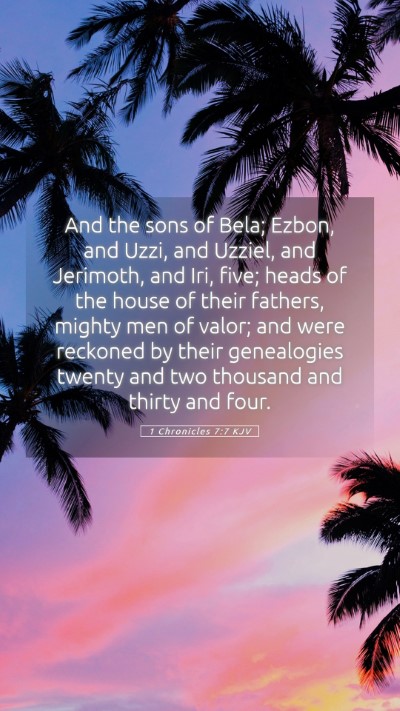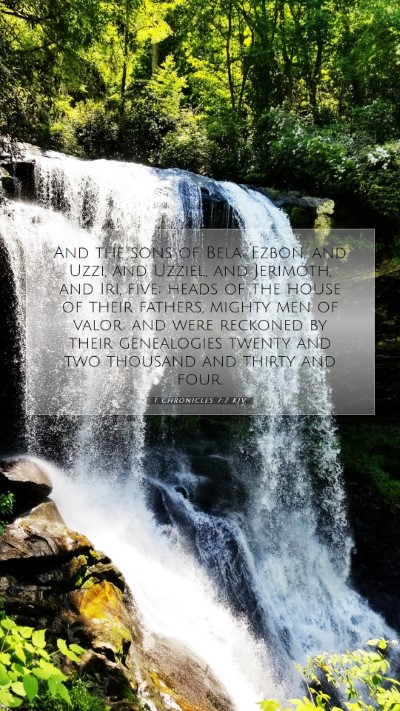Understanding 1 Chronicles 7:7: A Comprehensive Bible Verse Commentary
Verse: 1 Chronicles 7:7 - "The sons of Bela were Ezbon, and Uzzi, and Jeiel, and the sons of Ezbon; and he had two sons, Jerahmeel and Aholibamah."
Overview of the Verse
This verse is part of the genealogical records in the Book of Chronicles, which focuses on the lineage and heritage of the tribes of Israel. Specifically, 1 Chronicles 7 delves into the descendants of the tribe of Ephraim, and in this instance, it outlines the sons of Bela, who is one of the notable descendants.
Commentary and Analysis
Genealogy Significance: The genealogies in the Bible, particularly in the Chronicles, serve a crucial purpose in establishing the historical identity of Israel. According to Matthew Henry, believers can trace their lineage back to significant patriarchs, demonstrating God's providential care through generations.
- Matthew Henry: Notes that genealogies remind readers of God's promises and faithfulness. Each descendant represents a thread in the tapestry of God's covenant with His chosen people.
- Albert Barnes: Highlights that by listing these names, the Scripture preserves the identity of the clans and serves an important role in the context of Israel's restoration and national pride.
- Adam Clarke: Points out the importance of each name, suggesting that these individuals contributed to the ongoing story of Israel as it leads up to the coming of Christ.
Biblical Exegesis of Key Terms
In 1 Chronicles 7:7, the focus on Bela and his sons indicates a point of interest in the broader narrative of the tribes of Israel. To fully grasp the implications of this verse, it is helpful to engage in Biblical exegesis, understanding the etymology of names and their significance.
- Bela: Meaning "destroyer", signifies a role in biblical history as those who faced judgment.
- Ezbon: Often associated with the idea of “tenderness” or “delicate,” which could represent various attributes within the lineage.
Practical Applications
The genealogies, while often seen as dry lists, serve multiple purposes in Bible study. For modern readers, applying Bible verses to daily life might include the following insights:
- Understanding one’s heritage and the role it plays in shaping identity.
- Recognizing the importance of every believer in God’s plan, much like the seemingly minor figures in these genealogies.
- Encouragement to reflect on divine faithfulness across generations.
Related Bible Cross References
- 1 Chronicles 5:24: Lists clans of the tribe of Reuben, illustrating the significance of genealogy.
- Genesis 46:21: References the descendants of Benjamin, another son of Jacob.
- Matthew 1:2-16: The New Testament genealogy of Jesus, linking back to Old Testament ancestors.
Conclusion
In summary, the careful examination of 1 Chronicles 7:7 through the lens of public domain commentaries provides a rich understanding of the genealogy of the Israelites. Bible verse explanations such as these facilitate deeper connections with the Scriptures, allowing readers to appreciate their relevance and significance in both historical and contemporary contexts.
For Further Study
Engage with resources on Bible study insights, and consider joining Bible study groups or utilizing Bible study tools for a structured approach to understanding complex passages.


